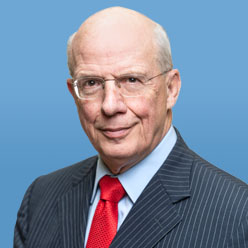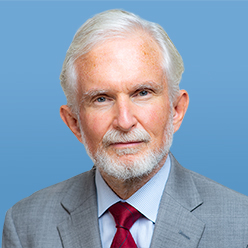Under the leadership of a reforming president over the past three years, Uzbekistan is resuming the importance within Central Asia and in Eurasia broadly which its size, geography and history merit. To examine the significance of the country’s reforms — and especially their potential for US interests — a delegation of the American Foreign Policy Council led by its president Herman Pirchner visited Uzbekistan June 10-18.
Caucasus Institute Svante Cornell delivers the welcoming address
at the 2019 CAMCA Regional Forum
The centerpiece of the visit was the delegation’s participation in the 2019 CAMCA Regional Forum, June 12-14 in the capital, Tashkent. CAMCA (Central Asia, Mongolia, the Caucasus, Afghanistan) is a multilateral network initiated in 2014 and sponsored by AFPC’s Central Asia-Caucasus Institute (CACI) and the Rumsfeld Foundation. CACI, under its founder and chairman, Dr. S. Frederick Starr, and director, Dr. Svante Cornell, provided the genesis for the very broad regional approach underlying CAMCA, while the Rumsfeld Foundation has supplied much of its human capital in the form of the growing body of Rumsfeld Fellows, talented young people from the region who have participated in study programs in the United States and now constitute the core of the CAMCA Network.
The 2019 Forum was the sixth in a series which rotates among capitals of the ten participating countries (Afghanistan, Armenia, Azerbaijan, Georgia, Kazakhstan, Kyrgyzstan, Mongolia, Tajikistan, Turkmenistan, and Uzbekistan) to facilitate intense discussion of common issues and to foster personal and institutional ties within the Network to break away from a narrow single-country approach to dealing with Eurasian development. The Forum this year, as before, attracted attendees from well beyond the actual CAMCA countries, testifying to the growing international recognition of the global significance of a region which occupies the vast landlocked space between Russia, Iran, China and south Asia.
The several hundred participants in the 2019 Forum — meeting in over a dozen plenary and working group sessions — addressed issues of economic development, intraregional trade, attracting foreign investment, alternative models of regional coordination, building innovation skills and education, fostering entrepreneurship, developing intraregional finance, state building and institutional reforms, engaging Afghanistan more within the region, the digital transformation, developing regional media, expanding transportation links in all directions by both physical and digital means, encouraging cultural development and fostering tourism in this historic region, and other relevant political and social issues.
While the list of speakers included current and former senior government officials of CAMCA and other states, no individual was more welcomed at the Forum than was Dr. Starr, both for his key role in the initiation of the CAMCA process and for his unparalleled scholarship on the great intellectual and cultural history of Central Asia, till now little appreciated or even known in the outside world. His recent seminal work, “Lost Enlightenment”, is now available in twenty-three languages with more coming. Many of these editions reflect the intense interest of people in the region itself to learn more about their own history from a scholar of global stature after decades of Soviet-directed propagandistic semi-history. An obvious goal for every member of the CAMCA Network in Tashkent was to be photographed in company with AFPC’s-own Frederick Starr.
Beyond the Forum, the AFPC delegation met with key Uzbek officials to understand better the changes going on in their country. Uzbekistan constitutes half the population of the five Central Asian countries and is the only one which borders all the others (plus Afghanistan). As the home of some of the region’s greatest historical cities — such as legendary Samarkand, Bukhara, and Khiva — and of many of its best educational institutions, Uzbekistan enjoys a natural leadership role which, sadly, it did not perform for most of the period since independence in 1991. However, over the past three years the new presidency of Shavkat Mirziyoyev has initiated major reforms in many fields, but especially in moving the economy away from a centrally-planned approach toward market-based solutions. While the country still has a great deal of change ahead, almost all outside observers have been impressed (if not astonished) at the extent and speed of the Uzbek reform program thus far.
Sen. Sodyq Safoev during a break in CAMCA meetings.
A leading figure in the reforms is a familiar face in Washington, that of one-time ambassador to the US Sodyq Safoev, later foreign minister and now First Deputy Chairman of the Senate of the national legislature, the Oliy Majlis of Uzbekistan. This position puts Safoev in first place in the line of succession to the president. The senator delivered a brilliant keynote speech for the CAMCA Forum and attended several of its sessions and dinners. Although obviously one of the busiest men in Central Asia, Senator Safoev took time to meet with the AFPC delegation outside the Forum twice, first for an extensive dinner conversation on its initial evening in Tashkent and later for a private exchange of views in anticipation of his upcoming official visit to Washington in July. Safoev is held in high esteem by the many US officials who have dealt with him over the years for his intelligence and competence and for his personal integrity.
Although many senior Uzbek officials were in neighboring Kyrgyzstan for a meeting of the Shanghai Cooperation Organization, the AFPC delegation was able to have intensive discussions with Deputy Minister of Investments and Foreign Trade Laziz Kudratov and with the staff of the presidential Institute for Strategic and Regional Studies. They also enjoyed an informative dinner with the new US ambassador, Daniel Rosenblum. In addition, they had candid exchanges with other Uzbek officials on the margins of the Forum, which was well attended by the host government.
Roughly the size of California, Uzbekistan has a young population, with half born since independence and hence no memory of the Soviet era. With a median age of twenty-eight, the available labor force is both well-educated and cheap. The government is actively diversifying the economy away from the previous cotton “monoculture” to develop other agricultural and mining products and the country’s abundant natural gas, plus manufacturing and textiles. With a three-year roadmap for intended WTO entry, the authorities recognize that creating a modern financial sector is essential to attract the level of foreign direct investment needed for sustained development. In this regard, one of the most important reforms already undertaken was making the local currency fully convertible. They are considering the use of British law in the financial sector for foreign firms. Uzbekistan does a great deal of trade with China, but has been cautious about participation in the “Belt and Road” program, in which it has no current project. Rather, the government has encouraged the growth of small and medium-size enterprises combined with some large joint ventures such as automobile production in partnership with South Korea (most of the passenger cars in the streets are locally made). A reflection of the positives and negatives of reform is that half of GDP is estimated to be “grey market,” meaning there is huge untapped entrepreneurial talent and energy in need of favorable market conditions, especially financial and legal conditions, to bring productive efforts into the open market.
Uzbek officials candidly seek a “new epoch” in relations with the United States, which have experienced some fairly sharp ups and downs over the past quarter century. With economic reform well underway, the Uzbek government feels it can now be more of a partner for Washington than in the past, when it feared encroachments on its sovereignty in the areas of human rights and democratization. It wants American investment and trade, seeing the US oil and gas sector as of special potential. Tashkent seeks US official assistance in reforms, especially in legal reforms, but does not want to be pushed. With both Russia and China increasing their roles in Central Asia, a greater American presence is welcomed. However, Tashkent is seriously concerned that a US withdrawal from neighboring Afghanistan would contribute to regional instability at Uzbek cost.
The AFPC delegation could easily observe many of the positive changes underway as they traveled through the city and some of the countryside, particularly for those who knew the country in both Soviet and post-Soviet periods. Tashkent today is predominately a modern city with up-to-date infrastructure. The countryside observable from a Western high-speed train to Samarkand and Bukhara was orderly and prosperous and notably lacking the evident poverty which characterizes many developing countries outside the large cities. Still, the delegation did not have time to visit the most populous regions in the east of the country which have a history of serious incidents of Islamist upheaval, although not for over a decade. Average wage levels in Uzbekistan remain quite low, as this is still very much a developing country, with much of the labor force abroad (especially in Russia) to provide remittance incomes for their families. A piece of good news it that the reforms have created a modest reverse brain-drain, in the return of some of the highly talented young people who went to Europe or America for education and stayed. Now, they see a future at home. Theirs is perhaps the keenest judgment on the prospects for reform in Uzbekistan


